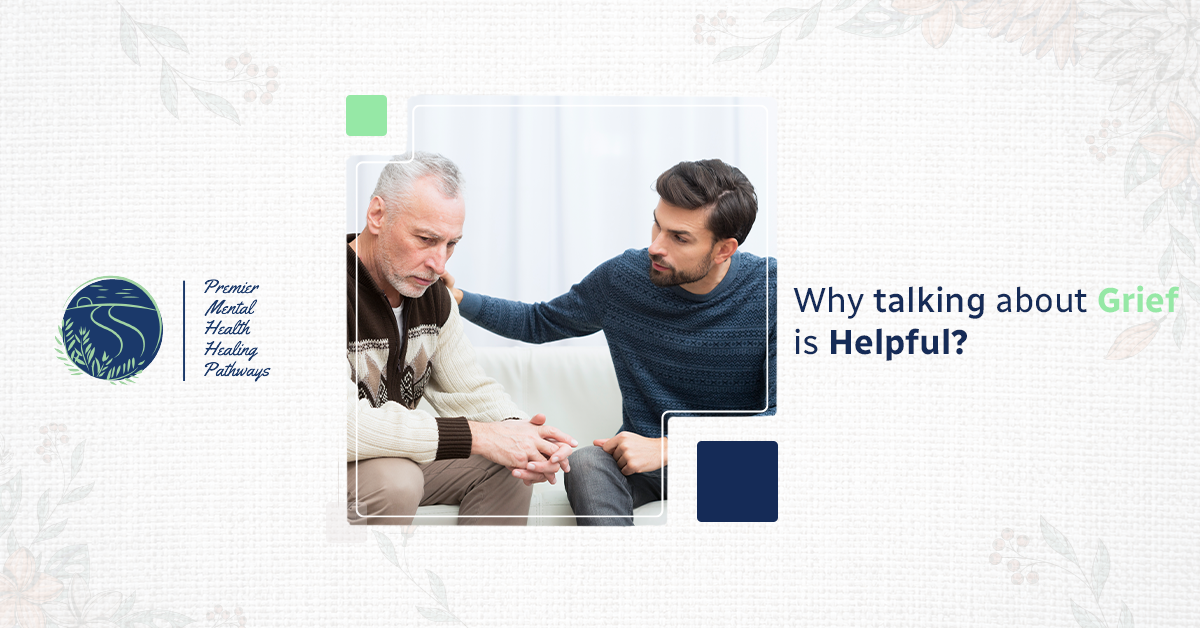Losing someone or something important brings grief. It makes people feel lonely or sad. But why talking about grief is helpful? Talking helps to share feelings, heal pain, and feel less alone.
Below, we will explain the importance of the grieving process after experiencing loss and why talking about it makes a big difference.
Are you seeking professional support for yourself or a loved one? Premier Mental Health Healing Pathways offers compassionate grief and bereavement treatment to help you heal. Contact us.
What Is Grief?
Grief is the natural reaction of the human psyche to the losses and the presence of sorrow, rage, hope, and blame. It can occur when you lose your family member, friend, dog, or job, or when you go through an important but difficult life transition.
Is Grief an Emotion?
Grief isn’t just one feeling. It’s a complex process with many reactions. You may perceive unhappiness, irritation, blame, or occasionally find comfort.
The Difference between Mourning and Grief
Mourning and grief often mix in conversation, but they are very different. Grief is the internal storm, a deep heartache we feel.
Mourning is the outward expression, a way to show our sorrow. It can take the form of tears, stories, or memorials. Discussing grief is a part of mourning, helping us manage our emotions.
Types of Grief and Their Impact
Each grief is unique. Various individuals face integrated grief, where they learn to live with the loss in a healthy way. Others struggle with prolonged grief, which makes daily life difficult.
Grief can also be different depending on the type of loss. For example, mourning loss of a friend is different from losing a parent or child. Understanding these differences can help provide better support for those grieving.
Why Talking About Grief Is Helpful?
A lot of individuals struggle to discuss grief. They may feel like no one will understand or worry about burdening others. But keeping grief inside can make it harder to heal. So, why talking about grief is helpful? Here are some reasons:
-
It Helps You Process Your Emotions
Grief is complicated, and sometimes, emotions become too much to handle. Talking about grief can be helpful. It lets you work through your feelings rather than keeping them bottled up.
-
It Reduces Feelings of Isolation
Most of us believe life’s unfairness is more than we can take. Many others feel the same way when you share your struggles with depression. This realization of belongingness can be a source of solace.
-
It Supports Healing
The grieving process can take time, and getting through grief requires emotional support. Speaking about your loss helps you heal.
-
It Prevents Incomplete Grief
If you fail to convey your feelings, you may experience incomplete grief, where feelings that aren’t resolved hang on for ages. Talking about your feelings can help prevent this.
The 10 Stages of Grief
You recognize the five stages of grief. However, additional stages exist. Here are the 10 stages of grief:
- Shock: Feeling numb and unable to believe what happened.
- Denial: Refusing to accept the loss.
- Pain and Guilt: Feeling sad and blaming oneself. (Feeling guilty is normal when experiencing grief)
- Anger: Being upset at the situation, oneself, or others.
- Bargaining: Thinking of ways the loss could have been prevented.
- Depression: Feeling deeply sad and uninterested.
- Reconstruction: Gradually learning to cope with life after the loss.
- Acceptance: Understanding and accepting the loss.
- Integrated Grief: Finding a way to live with the loss but still remember the loved one.
- Hope and Growth: Moving forward while keeping memories alive.
Knowing these stages helps people cope with grief.
Does Grief Cause Exhaustion?
Yes, grief can cause exhaustion. Loss is the emotional weight of grief which makes you physically and mentally drained, you might collapse into fatigue thereby.
Sometimes it causes a lack of concentration and low motivation. This loss-induced stress can disrupt your usual dosing schedules and lead to a bad night’s sleep or insomnia. These sleep problems add to feelings of tiredness.
Grief is also loaded with intense emotions like sadness, anxiety, and anger that can drain you from the inside. Just as with psychological problems people will be ill with body ones like stiff muscles, headaches, and a weakened immune system.
This hard, in turn, makes it difficult to be rested. However, taking care of yourself with proper rest, nutrition, and support can help manage grief-related exhaustion.
Can Grief Cause Fatigue?
Yes, grief affects sleep, appetite, and energy. That’s why reaching out for support is vital. Grieving thoughts can make a person feel mentally and physically exhausted.
Common Signs of Grief-Related Fatigue:
- Feeling tired all the time
- Lack of motivation
- Sleep disturbances
- Trouble focusing
If you notice these signs, try talking to someone. Talking about grief is helpful in reducing stress and regaining energy.
Grief Discussion Questions to Start Healing
If you want to discuss grief but aren’t sure where to begin, consider these grief discussion questions:
- How are you feeling today?
- How has your grief changed over time?
- What helps you cope with grief?
- Have you found any meaning in your loss?
- What do you miss most about your loved one?
- What helps you when you feel sad?
- Do you have any favorite memories to share?
These grief discussion questions can help start important conversations.
Moving Forward While Honoring Your Loved One
Grief never completely fades, yet it transforms as time passes. Early grief feels overwhelming, but as time passes, persons find paths to reconcile loss with their living. Ways to move forward while honoring your loved one:
- Create a memory book with photos and stories.
- Light a candle in their honor on special days.
- Volunteer or donate to a cause they care about.
- Continue talking about them and sharing their legacy.
Final Thoughts
Grief is a typical response to loss. It’s tough, but it paves the way to recovery. Why talking about grief is helpful? Talking helps you process feelings and connect with others.
Sharing allows you to manage the confusion and move forward healthily. Holding in grief can weigh you down, leading to physical and emotional struggles.
On the other hand, sharing it can bring relief and comfort. If you’re grieving, remember talking about grief soothes the soul.
If the weight feels heavy, reach out for support. Help is available to guide you toward healing.
FAQs
Can grief cause tiredness?
Yes, grief often leads to tiredness. Grief can be exhausting. It often disrupts sleep and drains energy. As a result, daily tasks become tough to manage.
Can grief lead to loss of appetite?
Yes, grief is also a health issue that affects some physical aspects, including eating habits. Frequently, people under stress eat less than usual, while others use food as comfort.






No comment